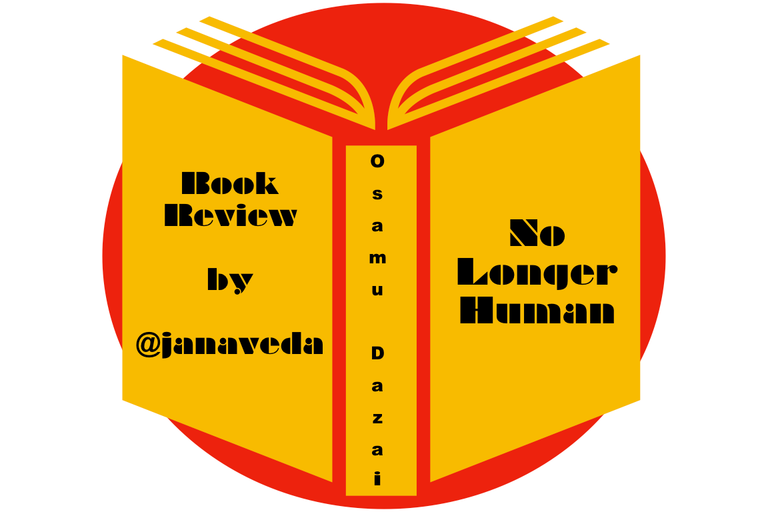

'No Longer Human' is the English translation of the title of a famous work of contemporary Japanese literature. At first, such a statement caught my attention. I asked myself: Could it be possible that someone could fit the attributes to be unworthy of belonging to humanity? I thought to myself: perhaps inspired by some historical or fictional character of extreme evil! But, as I delved into its pages, too short (in my opinion) for the novelistic genre, I found the perspective and psychological description of a depressing and stormy tone in a fluid and catching prose that poses the search for the individual's place in the world. I was surprised and saddened by the first-person testimony it evidences, which, in a certain way, without going to the extreme, is not alien to us beyond distances in time and space.
The author, Osamu Dazai (pseudonym of Shūji Tsushima), was one of the most influential Japanese writers of the 20th century. Coming from a wealthy (not to say aristocratic) family in the northern provinces of Japan, he had a short life, marked by economic scarcity: the product of a passionate life among women and the intake of alcoholic beverages that led him to four suicide attempts, the last one being fatally successful. In addition, his dabbling with Marxist ideas led him on occasion to prison before the flea of the anti-communist authorities. However, this does not detract from his talent for writing. Some authors compare him in style and motives with Fyodor Dostoyevsky.
'No Longer Human' was published in 1948, the same year in which the author, in the incipient effervescence of his success, committed suicide by tying himself to his lover in one of the canals of the Tama River. When I finished reading it and reviewed some references and brief biographical sketches of the author, I was horrified by its autobiographical content. Perhaps, the work resembles the writing that a suicide usually leaves to justify the decision. Of course, this, although speculation, does not cease to resonate with us to enter into the labyrinths of the human being. How many will go around the world laughing and being jocular to conceal their fears and broken souls?
As you may know, those of you who have read my reviews of readings, I also usually comment on the translator to recognize the merits of those who bring good literature to our Spanish language. On this occasion, my recognition goes to the Spanish journalist, writer, and editor Montse Watkins, who sadly passed away in 2005 in Japan. Reading her biography on Wikipedia is a tribute to reading some of her fiction in the future. I have in mind: Las gafas rotas: pequeña sátira de la vida en el Japón moderno (1996). Short novel. Editorial Gendaikikakushitsu / Luna Books, 1994. ISBN 4-7738-9602-7.
In conclusion, I encourage you to read this short, but at the same time, dense and profound Japanese short novel. If you are a voracious reader, as I sense you are, you will finish it in one sitting. At this moment, I think with some sadness about the sociocultural phenomenon of suicide. Yes, life is beautiful and brief: a marvel in the vastness of the universe. However, some choose death. One to which we are all sentenced, even before we are born.
Thanks for joining me here. We'll keep reading to share our passion for books.
Note: For English speakers, this is the version by Donalds Keene, published in 1959.

The book's review by @janaveda
Originally written in Spanish and translated into English with www.deepl.com (free version)
The thumbnail was created from my drawing made in Krita and edited with Keynote
Thanks for reading me. I hope this review is to your liking. I would very much like to read your comments in this regard to enrich myself with your criticism.
Tired...! Are you no longer satisfied with traditional social networks?
Then I invite you to get to know Hive by clicking here.
Join our global community, where uncensored freedom is our north.



“Indigno de ser humano” es la traducción al español del título de una obra célebre de la literatura contemporánea nipona. En primera instancia, captó mi atención tal aseveración. Me pregunté: ¿Sería posible que alguien calzara los atributos para ser indigno de pertenecer a la humanidad? Me dije: ¡quizás, inspirada en algún personaje histórico o ficticio de suma maldad! Pero, al adentrarme en sus páginas, muy cortas (a mi juicio) para el género novelístico, encontré la perspectiva y descripción psicológica de tono deprimente y tormentoso en una fluida prosa atrapante que plantea la búsqueda del lugar del individuo en el mundo. Quedé sorprendido y entristecido por el testimonio en primera persona que evidencia, y que, en cierta manera, sin llegar al extremo, no nos es ajena más allá de las distancias en tiempo y espacio.
El autor, Osamu Dazai (seudónimo de Shūji Tsushima), fue uno de los escritores japoneses más influyentes del siglo XX. Proveniente de una familia acaudalada (por no decir aristocrática) de las provincias del norte del Japón, tuvo una vida breve, marcada por la escasez económica: producto de una vida licenciosa entre mujeres y la ingesta de bebidas alcohólicas que lo llevaron a cuatro intentos de suicidios siendo el último, fatalmente exitoso. Además, toqueteos con las ideas marxistas lo llevaron en ocasiones al presidio ante la pulga de las autoridades anticomunistas. Sin embargo, esto no des merita el talento para la escritura. Algunos autores lo comparan en estilo y motivos con Fiódor Dostoyevski.
“Indigno de ser humano” se publicó en 1948, el mismo año en que el autor, en la incipiente efervescencia de su éxito, se suicida atado a su amante en uno de los canales del río Tama. Al terminar de leerla y revisar algunas referencias y breves semblanzas del autor, me horrorizo ante su contenido de corte autobiográfica. Quizás, la obra asemeja al escrito que suele dejar un suicida para justificar la decisión. Claro, esto, aunque, especulación, no deja de resonarnos para adentrarnos en los laberintos del ser humano. ¿Cuántos irán por el mundo riendo y siendo jocosos para disimular los miedos y el alma quebrantada?
Como sabrán, quienes han leído mis reseñas de lecturas, también suelo comentarles sobre el traductor con la intención de reconocer los méritos de quienes llevan a nuestro idioma español la buena literatura. En esta ocasión, mi reconocimiento recae en la periodista, escritora y editora española Montse Watkins, fallecida lamentablemente en 2005 en Japón. Al leer su biografía en la Wikipedia, se me ocurre como tributo leer en el futuro alguna de sus ficciones. Se me antoja: Las gafas rotas: pequeña sátira de la vida en el Japón moderno (1996). Novela corta. Editorial Gendaikikakushitsu / Luna Books, 1994. ISBN 4-7738-9602-7.
Al concluir, te animo a leer esta corta, pero a la vez, densa y profunda noveleta japonesa. Si eres un lector voraz, como intuyo que eres, la terminarás en una sentada. En este instante, pienso con cierta tristeza en el fenómeno sociocultural del suicidio. Sí, la vida es bella y breve: una maravilla singular en la vastedad del universo. Sin embargo, todavía hay quienes optan por la muerte. Una a la que todos estamos sentenciados, incluso, antes de nacer.
Gracias por acompañarme hasta aquí. Nos seguimos leyendo para compartir la pasión por los libros.

Reseña del libro por @janaveda
La miniatura se creó a partir de mi dibujo hecha en Krita y editada con Keynote
Gracias por leerme. Espero que esta reseña sea de su agrado. Me gustaría mucho leer sus comentarios al respecto para enriquecerme con sus críticas.
¡Cansado! ¿Ya no te satisfacen las redes sociales tradicionales?
Entonces, te invito a conocer Hive presionando aquí.
Únete a nuestra comunidad global, en donde la libertad sin censura en nuestro norte.
